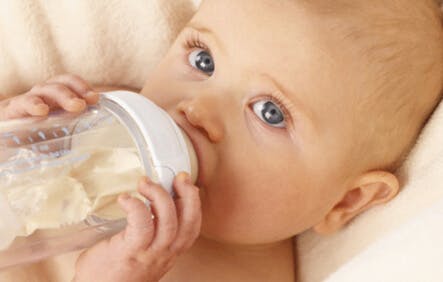Baby Bottles & Cereal

Question
I have heard different reviews about putting cereal in the bottle of an infant. Is it safe?
Dr. Greene’s Answer:
You’ve heard about it from friends, parents, and in-laws. You’ve seen it in Internet chat rooms and discussion boards:
“You’re so tired! You should put some cereal in your daughter’s bottle – then she’ll sleep through the night.”
“He’ll nap better.”
“Your son looks too skinny. You’re not feeding him enough. Add some cereal to the bottle – that’ll do the trick.”
“He still acts hungry? Try putting some cereal in the bottle. He’ll be much less fussy.”
“Spoon feeding is a hassle. Put it off as long as you can. Cereal in the bottle is quick, convenient, makes them sleep longer and cry less – what more could you want?”
Pediatricians Don’t Recommend Baby Bottles and Cereal
Your pediatrician says this is not wise (except as a treatment for reflux). Dietitians and nutritionists concur. Introducing solids before 4 months might cause food allergies. Your well-wishers discount these recommendations because cereal in the bottle worked wonders for their children!
Throughout most of human history children were exclusively breast fed for the early months. During the previous generation or two, when bottle-feeding became very popular, rice cereal was often put into the bottle at a very early age. What were the results?
Most children seemed to thrive. A small number of children, though, did not tolerate the addition, because their sucking and swallowing actions were not yet fully coordinated. They inhaled small amounts of the rice cereal into their lungs, which led to pulmonary problems.
Why Not?
I’m much more concerned about a subtler issue. Babies are born with a wonderful mechanism for knowing how much food they need. During the early months, they take their cues from the volume of what they drink. Adding cereal derails this mechanism. It forces them to take in deceptively large amounts of calories. It teaches them to overeat.
By starting with a spoon, resting between bites, and stopping when your child lets you know he’s full, you will be laying an excellent foundation for good eating habits throughout his life.
A major study looking for the causes of obesity found that short-circuiting young children’s self-regulation of how much they eat is a major cause of later obesity.1 Cereal in the bottle does just that.
Babies that are fed this way may appear to be unaffected – but those few weeks of added convenience may result in a lifetime of struggles with weight. This common practice may have contributed to our being the most obese generation in history.
Does it Work?
And here’s the biggest reason of all — it doesn’t even work. Scientists at the Cleveland Clinic studied the effect of cereal on sleep and found that adding the cereal did nothing at all to speed up the age of sleeping through the night. That first uninterrupted 6-hour stretch of sleep came no earlier in those who took cereal early.2
People swear otherwise. I suspect the reason is that kids do fall asleep a bit more quickly, and some babies may even go a bit longer between feedings. There is no scientific evidence, though, to support the claim that cereal in the bottle will help an infant increase total sleep or decrease crying.3
Drawing on the wisdom of experience and the latest scientific knowledge, the American Academy of Pediatrics recommends against adding cereal to the bottle. It may be tempting after your 16th straight sleep-deprived night to cut a bigger hole in the feeding nipple to add rice cereal. But it won’t offer lasting help, and it may be giving your baby a lasting gift that both of you will regret.
1 Birch LL, Fisher JO, The causes and health consequences of obesity in children and adolescents: development of eating behaviors among children and adolescents. Pediatrics 1998 Mar; 101(3)
2 Macknin ML, Medendorp SV, Maier MC, Infant sleep and bedtime cereal. Am J Dis Child 1989 Sep; 143(9):1066-8
3 Hall RT, Infant feeding. Pediatr Rev – 2000 Jun; 21(6): 191-9.


